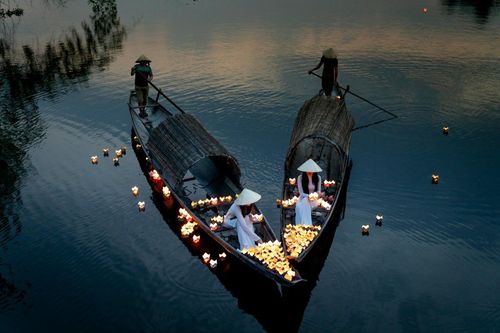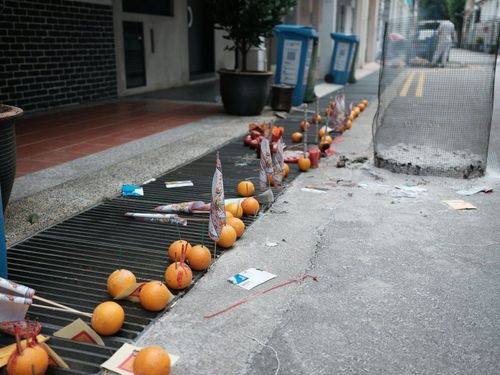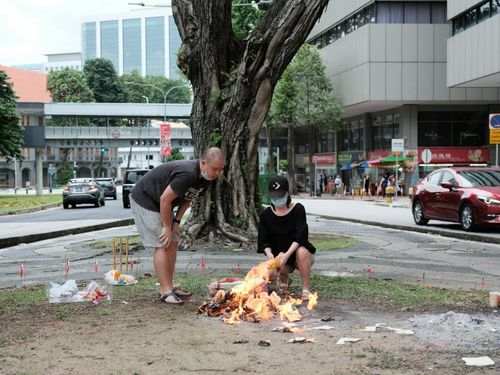What spirituality and culture are like in Asian communities? This article looks at the Hungry Ghost Day Festival, a meaningful tradition. Discover this important tradition and gain a deeper understanding of their unique rituals and customs.

The origin of the Hungry Ghost Festival and the Ghost Month in China is uncertain. Feast of the Gosht Day festival back more than 2,000 years. Some of the ancient folk religion is incorporated into Taoism, the indigenous religion of China. It is influenced by Buddhist and Taoist practices. The festival is traditionally linked to the concept of filial piety. Over time, these beliefs fused with Buddhist notions of karma. Life after death gave origin to today’s festival.
When is the Hungry Ghost Day Festival Celebrated?
Zhong Yuan Jie also known as de Hungry Ghost Festival is on the fifteenth day of the seventh month. It is usually celebrated in August or September. The festival lasts a month. The 15th is the main celebration day. In Singapore, Malaysia, Taiwan, Vietnam, and Hong Kong, celebrated the festival throughout the month. The Ghost Day festival ends with a big party on the 15th.
Rituals and Traditions of the Hungry Ghost Day Festival
During the Hungry Ghost Festival, families prepare big meals. People offer food to ancestors and spirits. These offerings usually include fruits, rice, meat, and incense. Ghost money is burned as a form of currency for the dead. Street shows, or "getai," are also celebrated to entertain the spirits.
Importance of Ancestor cult during the Hungry Ghost Day Festival
Ancestor cult is central to the Hungry Ghost Festival. Families visit graves and clean them. They also make offerings to guarantee their ancestors' well-being in the afterlife. This is a way to stay connected with the dead and ask for their blessings.Taoist and Buddhist Influences
The rituals of the festival are influenced by both Taoist and Buddhist traditions. Taoist rituals often include ceremonies to calm the spirits. Buddhist monks may use chants and prayers to calm the spirits. Both traditions emphasize compassion and respect for the dead. Many families float river lanterns on little boats in the evening.Community and Family Involvement
The Hungry Ghost Festival is not just a family event. It is a community event. The community organizes large-scale offerings and ceremonies. This community participation fosters a sense of unity and responsibility in the care of the spirits.
Superstitions and Taboos
People avoid activities during the festival to avoid offending or attracting spirits. These include: Staying out late at night, not swimming, not making important life decisions Ghost and spirit beliefs- Leaving chopsticks upright in a bowl of rice. It's bad luck. It may be like offering incense to the dead
- Don't step on or kick the offerings along the path
- Don't look under an altar table or you'll anger hungry ghosts
- Avoid wearing red, drinking alcohol, and staying near walls
- Don't cut your hair, shave, or hang clothes outside at night
- Avoid getting married, moving house, or buying a new vehicle during this period
Hungry Ghost Day Festival vs. Western Traditions
The Hungry Ghost Festival is similar to Halloween. Both festivals honor the dead and believe in spirits. Halloween is more playful. The Hungry Ghost Festival is more serious. It is about honoring ancestors and involving the community. It is a time to honor the spirits together. Halloween is more individualistic.The Festival preserves Chinese cultural heritage. It connects the present with the past. It reminds people of their roots and the importance of family.
The Fiesta is still relevant in modern society, even though its practices have changed. In cities, some traditional rituals are adapted to modern life. The festival values stay the same.

Tips for travelers visiting Asia during the Hungry Ghost Day Festival
Observing the festival provides a unique vision of the rich cultural practices of the region.- Do not take photos without permission
- Show respect for local customs and traditions
- Make offerings of food, incense, and other items at altars or designated areas to appease and honor ancestors and errant spirits
Stay Connected During the Hungry Ghost Day Festival with Yoho Mobile
While traveling during the Hungry Ghost Festival, staying connected is essential. Yoho Mobile offers reliable mobile services, ensuring travelers can easily navigate and enjoy their cultural experience without connectivity problems.
🎁 Special Discount for Our Readers!As a special treat for our readers, Yoho Mobile is offering an exclusive discount! Use our coupon code "YOHOREADERSAVE" to get your first order for FREE!Don’t miss out on this opportunity to stay connected affordably while exploring Asia. |
|
